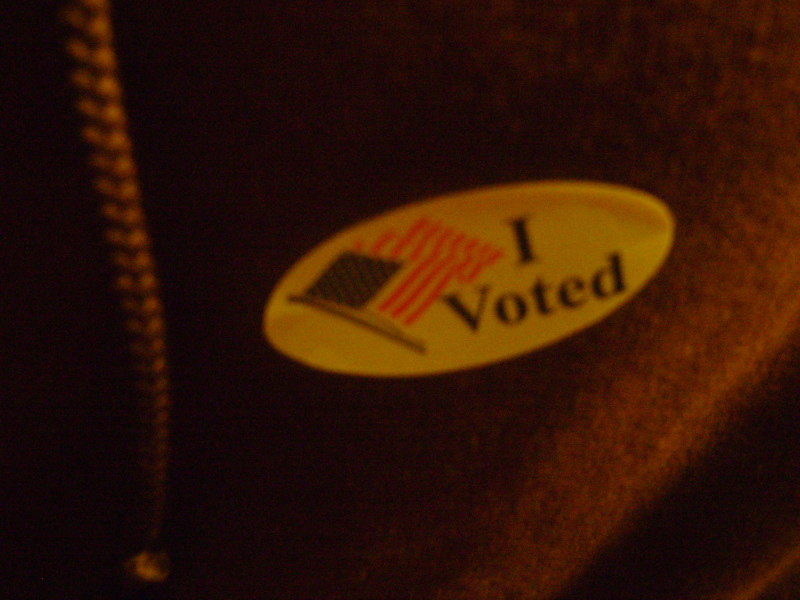
Two days ago, I voted early in Bloomington, Indiana. It took me around forty minutes and was a pretty great experience. I want to encourage everyone who is registered to vote, to do so, but even if you aren’t registered to vote, can’t vote, or choose not to, please go to a polling place on an early voting day, or election day, just to see what it looks like. For me, the early voting location in Bloomington provided me with a great vision for what I want the things that I do to look like. For all its limitations, the electoral process, for a moment, had engaged a multiracial, multigenerational group of people who spanned classes and backgrounds, thus involving a far more complicated mixture of people than my community’s power structure and the cultural and political projects that I am a part of. I want the things I do to involve and be accountable to people in this broad and complicated way.
I voted for Barack Obama in the presidential race and for a number of other candidates in state and local races who I believed reflected my ideas and values in a way that was substantially stronger than their opponents. I ask you to do the same. If you are registered to vote, please take the time this week to vote for Barack Obama and any other candidates who might create a better context for the cultural and political work that many of us are doing. If you are registered to vote, but are not convinced that you should take the time to vote, please read on.
I am under no illusion that this election, or any election, can bring the kind of radical societal change that I ultimately want to see. Moreover, I see how the electoral process can oversimplify, distort, and silence a vibrant set of beliefs and proposals and reduce them to vague generalizations or culture war. I shudder at the way in which the candidates change their ideas to appeal, not to the needs and concerns of real people, but to amorphous demographics. Watching the presidential race, I cringe every time Senator Obama talks about hunting down and killing Osama Bin Laden or changing the focus of U.S. military intervention from Iraq to Afghanistan. Even more, I am sickened by the way that Senator McCain has changed his rhetoric and selected a running mate to appeal to a bigoted and narrow-perspectived brand of conservative that was once his adversary. And, even though I am glad that Senator Obama’s fundraising might help him win the presidency, I am disgusted when I think of what could have been done with that money other than winning an election. Despite all of this, I feel good about voting for Barack Obama for president, as one part of all the commitments I hope to make towards building a different world. I can’t pretend to believe that I can convince anyone about why *they* should vote as I have. All I can do is try to explain why I have chosen to vote in the hopes that some of these things may resonate with some of the things that those reading this are feeling.
Context Matters
Radical community organizing, making independent art and music, direct action – these strategies of change happen in a cultural context that plays a huge role in the success or failure of these pursuits. As I stated earlier, I do not believe that any president can bring about the kind of change that I want to see, but I do feel like Barack Obama would, as president, set a powerful and positive context for my work towards that change. I see this election, not as a battle of competing policies, but as a referendum on very different views of the world and how one can engage in it.
What is Experience?
I think grassroots community organizing is extremely important. I think it can bring about the kind of changes in communities that politicians can’t. My vote for Barack Obama is an affirmation of this. His work as a community organizer in Chicago has obviously informed his politics and vision. I want to express that this kind of work, and not just military service or a political career, commands power and respect. Moreover, the Obama campaign itself is an affirmation of grassroots organizing. In the past, I advised people to vote, but not to let the campaign distract them from the work they were already doing. I now question the soundness of this advice. I have heard so many stories of people, working on the ground for the Obama campaign, having the really tough, soul-wrenching conversations in their communities about race and class that are so needed everywhere. In trying to convince others of something, they have had to think, and really think, about why they are themselves so committed. This is in stark contrast to the dangerous tendency I see in myself and many of my friends to settle with being right about something rather than engaging others to actually change things. For many, it is the first political movement to which they have ever given sweat or monetary resources. If the unpaid work and small monetary donations of so many can win an election, I can’t wait to see what else it can do. I hope that those who committed themselves to this one type of political involvement will continue to apply their passion and resources throughout their lives, regardless of the outcome of the election, but I feel that an Obama victory would do much to ensure this.
Experience with Race
During the election season, NPR has had a great series of stories where they talked to voters in York, Pennsylvania (not too far from where I grew up!) about race and the election. What NPR got very, very right is that they framed the conversation, not in terms of the race of the candidates, but in how the voters’ *experiences* with race affected their perspective on the election. To me, what is most paradigm shifting about Barack Obama’s candidacy is not the fact that he is multiracial, but that he has been able to reflect on and articulate how his complicated experience with race has shaped his life and informs his worldview and political ideas. In the NPR stories, a white woman said that she didn’t have much experience with race. As a multiracial person, I find this sentiment to be one of the most offensive and harmful examples of white privilege. It is, I believe, the reason I have heard, over and over, the misconception that people of color cannot be themselves racist, or that some white people fear reprisal if a black man is elected president. The United States is a multiracial country with an often shameful multiracial history. The assumption that only people who are not white have experiences with race is simply not true.
John McCain has experience with race. He is the adoptive father of a child who is not white. In fact, this was the subject of an ugly rumor, designed to hurt his chances in a Republican primary, that his daughter was actually his child from an affair with a non-white woman. The way that John McCain is perceived and the expectations, prejudices, and way of moving through the world that he has experienced will be profoundly different from his daughter. This is a challenge that many cross-cultural adoptive parents must struggle with, but McCain’s experience with this has not been part of the campaign. John McCain fought in a war that pitted him against people of a different race. He was captured, and tortured by some of them. In the not-so-distant past, McCain continued to refer to some groups of Asian people with the derogatory term “gook.†Again, coming to terms with the racism, xenophobia, and dehumanization that comes with war is a part of many peoples’, in particular soldiers’ experiences. Yet, the loudest commentary on race that has come from the McCain campaign has been from a small number of his most bigoted supporters.
If we, as a society, are going to get real about ending racism, if we are going to get real about coming to terms with the reality of a multi-racial United States – past, present, and future, then we need to be able to reflect on, and talk about our experiences with race. This needs to happen in our neighborhoods, and among the most visible representatives of our culture.
Culture Wars
I grew up in a part of Pennsylvania that is getting a lot of news coverage as the election comes to a close. John McCain believes it to be a stronghold of the kind of conservative base that will allow him to win the state, and the election. Right now, I live in Bloomington, Indiana where, just outside of the city limits, many would believe the same unyielding conservatism is represented. If there is one thing that has been disappointing about Obama supporters, it is that so many are willing to accept the line in the sand between cosmopolitan liberals and “ignorant rednecks.†I think this perspective is offensive and narrow. Many studies suggest that the rural vote is every bit as divided as most other places. As I drove, this past weekend, from Bloomington through the countryside to another town, I saw as many Obama signs as McCain ones. Growing up in a staunchly conservative area, I know that these beliefs are powerful. I know that bigotry is real. I know that these things come with the weight of history, traditions, and culture. But I also know that there are some, who come from those same places, from the same culture, through the same history, who come to very different conclusions in their life. Belief that we are born into red states or blue states, enlightenment or ignorance sells us all short. It absolves us from the responsibility of examining who we are and where we come from. I think that Barack Obama’s candidacy has consistently challenged this. John McCain, and especially his running mate Sarah Palin, are, quite cynically, suggesting that people should vote their race, class, and geography rather than their ideas, beliefs, hopes, and vision.
There are many other reasons why I felt good voting for Barack Obama, but the ones I’ve mentioned: that context matters and that we need to fundamentally challenge our ideas about where power comes from, how we think about race, and whether we view our world as a set of clashing monolithic blocks or a confluence of people with complicated interests and experiences, are the ones that mean the most. For the first time in my political life, they have made voting feel radical, in the original sense of the word, in the Ella Baker sense of the word, because I feel like, through this election, we could be that much closer to getting at the root causes of all the things in this world that we will change.
Love,
Geoff

